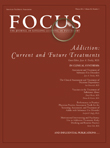From the Guest Editor
The use of substances dates back thousands of years. Opium was once called the medicine of the gods. This characterization rings true for those who take opioids for pain control. A host of analgesics come from opium, including the naturally occurring morphine and the synthetically produced methadone. However, added to prescribed medicines used primarily for analgesia, one must also mention heroin, one of the most addictive illicit substances man has created.
Other addictive substances reflect their two-faced nature: they are used for their positive effects and despised for the harm they cause. It is easy to understand why we are ambivalent about drugs and about those who misuse, abuse, and become dependent on them. Those who abuse alcohol, for example, may be maligned because they drink excessively, whereas most people limit consumption within appropriate bounds. There is intense research into the science of addiction that promises to explain the varied responses to alcohol and other drugs. Such research is likely to be based on a better understanding of neurotransmitters and the cascade of actions that substances cause, as well as matching psychosocial constructs with the development of addiction. The field awaits advancements in genetics to help in our work.
This issue of FOCUS contains articles that discuss addiction as a disease treated with psychotherapies and pharmacotherapies. Preventive approaches that have the potential to limit morbidity and mortality show promise. Most clinicians who read this issue have opportunities to affect the lives of those who misuse substances. I hope you find this issue useful in the information it provides and in the encouragement it offers.



